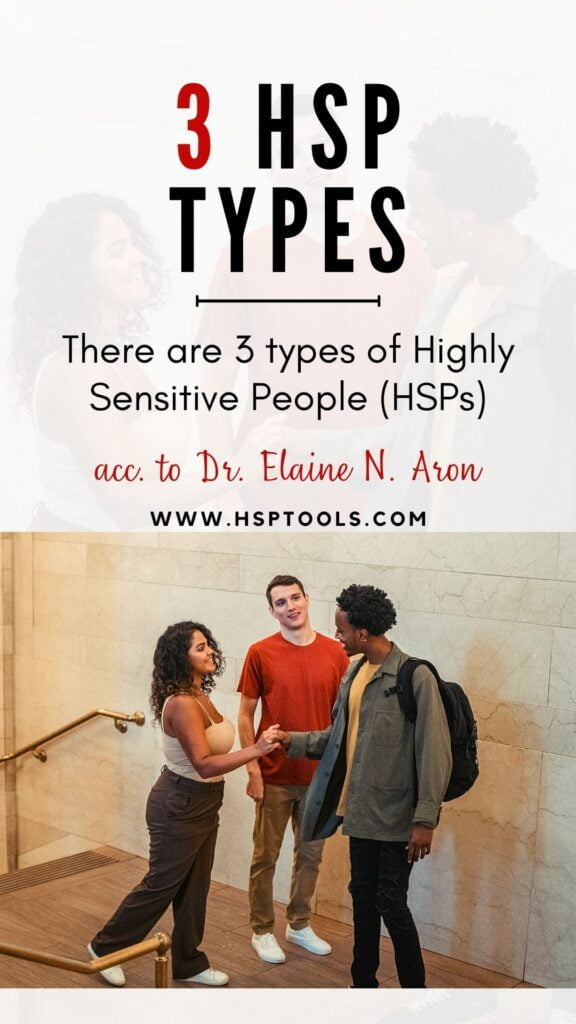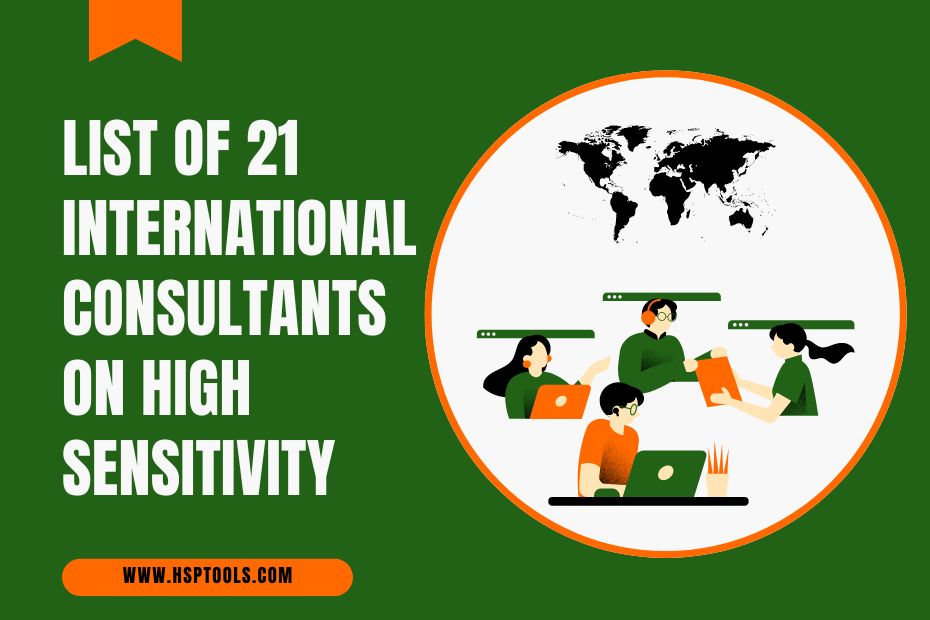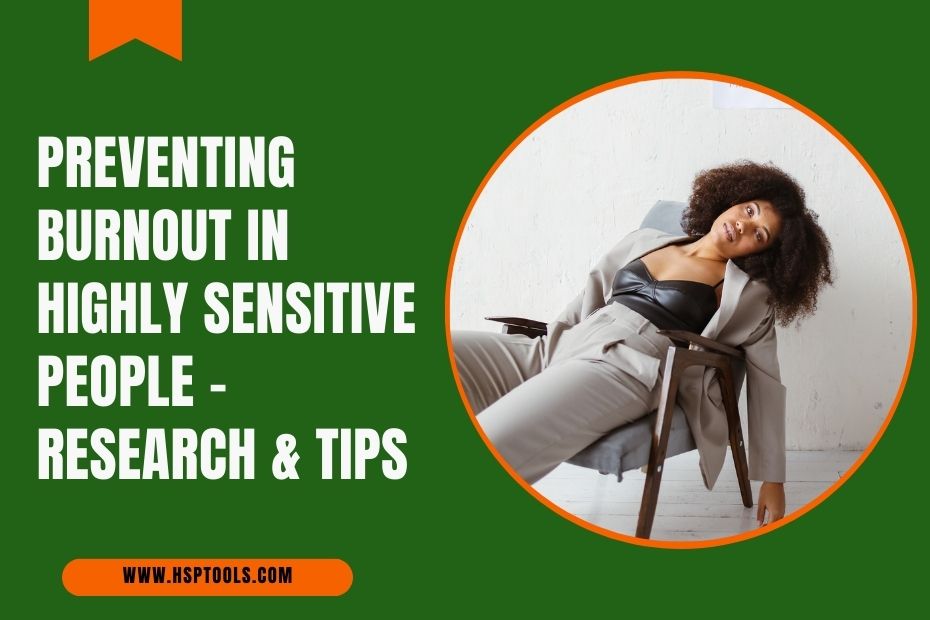These are the 3 Types of Highly Sensitive People (according to Dr. Elaine Aron)
It’s easy to think Highly Sensitive People (HSPs) are cut from the same cloth. To think they’re all the same because they share common characteristics of High Sensitivity. And to think that one solution or resource will benefit all HSPs.
But this couldn’t be more wrong.
Just as there are different types of people in this world, there are different types of Highly Sensitive People in this not-so-sensitive world.
This post shares three HSP types as mentioned in this video by Dr. Elaine N. Aron (embedded below).
3 Types of Highly Sensitive People

1. The Extroverts
There’s a common misconception that all HSPs are inhibited, shy, introverted, and reserved. And while this might be true for some Highly Sensitive People, it isn’t true for all.
In her research for The Highly Sensitive Person book, Dr. Elaine N. Aron found that 30% of HSPs are extroverts.
That’s right! The first entry in our list of three types of Highly Sensitive People (HSPs) are the ones who identify as extroverts.
And just for good measure, allow us to explain who an extrovert is, and share a few characteristics of extroverts.
An extrovert is a person who thrives on social interaction. Someone who tends to be socially confident (something most HSPs aren’t), and outgoing. This someone will have some or all of these characteristics:
- You thrive around people
- Social settings seem to be your jam
- You have lots of friends
- You love to talk out your problems
- You’re always taking risks
- You don’t need a lot of time alone
- Your schedule is quite flexible
If any of these traits feel relatable, you may be part of the 30% that are extroverted.
And Please Note:
While a typical extrovert may “not need a lot of time alone” and may “always take risks”, HSPs who are also extroverts differ in this.
Extroverted HSPs will require more time alone to recharge and regroup before their next social hang. They will also pose to examine and think of safety first before taking any risk.
2. The Introverts
Coming in second in our list of three types of Highly Sensitive People are Introverts, representing the other 70%.
As Healthline defines in this post, an introvert is often considered quiet, reserved and thoughtful. Someone who doesn’t seek out special attention or social engagements, as such events make them exhausted and drained.
And this is where the confusion comes in.
Because Highly Sensitive People are often overwhelmed, exhausted, and drained by too much stimulation, they’re often mistaken for introverts.
But being an HSP and being an introvert isn’t the same. The two personality traits may share some characteristics but they’re still separate.
So, you can be an introvert and not be an HSP. And you can be an HSP and not be an introvert.
To know if you fall under the introvert banner of types of Highly Sensitive People, see if you possess the characteristics below.
- Your own company is the best type of company
- You prefer to work alone
- You have few close friends
- Social interactions tend to drain and overwhelm you
- You’re often curious
- You prefer to write out your thoughts than speak them
- You feel things intensely
3. The High Sensation Seekers (HSS)
Away from the extroverts and introverts, we have high sensation seekers (HSS).
As the name suggests, this category of Highly Sensitive People is always seeking high sensation. They seek new, and exciting, experiences and are always on the frontline for novelty.
Knowing HSPs, and the common characteristics that define them, it may be hard to believe that one can be an HSP and an HSS. And many HSPs have wondered how they can feel so much and yet have a need to be out there exploring the world.
What they don’t know is, that they’re HSP/HSS – Highly Sensitive People who are also High Sensation Seekers.
And as Dr. Elaine N. Aron explains,
HSP/HSSs have a strong desire for novelty and the “good stuff” in life, but are not willing to take high risks to get these. And since there’s plenty of novelty and pleasure to be found without taking risks, HSPs who are also HSSs tend to do just that–enjoy safe novelty and eagerly go after pleasures that are not dangerous.
So, yes, you can be a Highly Sensitive Person (HSP) and a High Sensation Seeker (HSS) – or simply, HSP/HSS.
Signs you’re an HSP/HSS
- If you stay home for long, you get restless
- You don’t like waiting without something to do
- You rarely watch a movie more than once
- If it were safe, you’d take a drug that causes you to have a strange experience.
- You’d rather go to a new place you may not like than go back to a place you like.
- You get bored spending time with the same people
- You enjoy the unfamiliar
- Your friends say it’s hard to predict what you’ll do next.
- You avoid a daily routine.
- You love to explore new areas
Etcetera.
If you find you relate to some (or all of) these characteristics, you might be an HSP/HSS. Take this free test to find out for sure!
Final Word on the 3 Types of Highly Sensitive People
Being that HSPs have other individual innate traits, there could be many other types of Highly Sensitive People to explore.
However, these are the main ones currently identified by the present research.
So there’s a chance, that as an HSP, you’ll fall under one (or even two) of these types of Highly Sensitive People. Because as with all personality traits, there’s a spectrum you fall on.
And you can be a little bit of everything or fully one thing. It depends on you as an individual.
I hope this post helps you understand the different aspects of being a Highly Sensitive Person.
***
Keep Reading
- 14 Health-Related Highly Sensitive People Problems
- What You Need to Know about The Four Tendencies by Gretchen Rubin
- 13 Top Facts about Highly Sensitive People
- 17 Simple Ways to Take Care of Your Mental Health in 2023 (as a Highly Sensitive Person)
- How to Communicate with a Highly Sensitive Person (in 5 Simple Ways)
- What HSPs Need to Be Happy (Our Top 10 Picks)














